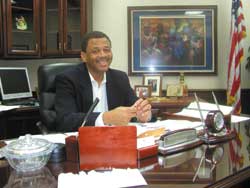Regardless of color, Joseph has lived a life of example for today’s youth
Published 12:00 am Tuesday, March 1, 2005
By KEVIN CHIRI
Publisher
LAPLACE – Whitney Joseph Jr. may be one of the top black leaders in St. John Parish public office, but the life of the 59-year-old parish assessor should be an example to young people today, black or white.
While Joseph may get a little extra attention during February as Black History Month draws the spotlight to black leaders in communities around the nation, the life the longtime River Region resident has led speaks volumes about the way young people need to think as they head into their own lifetime of challenges.
From a childhood that stressed Catholic values centered on the Ten Commandments, to an early adult life when he followed his father’s example in working for an organization that fought for equality for African Americans, Joseph is a man who should be listened to by young people of any color.
After serving 30 years as the Chief Deputy Assessor of St. John Parish, he won election last year as the new assessor, becoming the highest elected black official in St. John.
Joseph grew up in a somewhat unusual situation as his parents sent him to Convent, La. to live with his grandparents for nine months out of the year, all so he could attend a Catholic school called St. Joseph’s. He saw his parents at times on weekends, and then returned home for the summer.
But Joseph said the love and guidance given to him by his grandparents made lasting impressions about just what kind of life he would live.
“Not only my grandparents, but both my parents, really reinforced the moral values of the Ten Commandments in me. It was a serious thing to them and that never left me even as I headed into adulthood,” he said.
And he found a strong example about work ethic everywhere he looked around his family.
“My parents both worked hard all their life, and my uncles all made it clear to me that if I wanted something, I better get out and work for it,” he said. “I grew up thinking that way for the rest of my life. There was none of this foolishness you see these days with so many people wanting to get free support for their lives.”
And as if that didn’t set a good enough example for him, he got a lesson about discipline when he was in elementary school that he clearly remembers until this day.
“I always remembered this day in elementary school when I woke up and it was kind of cold outside, so I announced that I wasn’t going to school. My uncle grabbed one of those cattails off the wall and swatted me real good one time. That was the end
(See Joseph, Page 7A)
(From Page 1A)
of it! I didn’t say another word, and it was amazing how much I loved school from then on,” he said with a laugh.
His mother and father moved to Reserve in 1955 as he was entering high school, as his dad wanted to get out into the country, solidifying the family support that kept him on track.
“I just lived a real good life, and really felt loved by my parents and grandparents,” he said. “I remember when I was living with my grandparents how my grandfather would tell me a story every night before bed, and my grandmother always made me sit down after school and do all my homework. That’s the kind of relationships I think we see are missing in too many families today.”
His father set a further example of community involvement, staying active in the NAACP, and urging his son to get involved in politics. Even though Joseph was a successful math teacher, having graduated from Southern University, he was picked by the members of the Third District Voters League as the man they wanted appointed as chief deputy assessor in 1974.
“Our group had a positive approach to being active in the community, and making it clear that we wanted blacks to have some meaningful positions. Mr. Henry Hotard was elected assessor and we knew that he would appoint a black as his chief deputy, and I was the one chosen for the position,” he said. “Going into politics was never anywhere in my wildest dreams, but my father thought it was a great opportunity for me.”
Joseph said he was pleasantly surprised when he got his first paycheck, which was $812 a month, far more than the $500 a month he was earning as a teacher.
“You know, I never had asked how much I would make in the job,” he said with a smile. “I guess I should have, but I just never did. Of course I made sure and talked to my wife about whether I should take the job, but she knew it was something we wanted to help put blacks in some meaningful positions.”
Now 30 years later, taking over as assessor just at the beginning of 2005, Joseph continues to try and make a difference to see strides made for blacks.
“Things have changed a lot in 30 years, and integration definitely helped,” he said. “I think it showed other people that a child is a child, and black or white, they all have the ability to learn.”
He believes blacks are doing well now, and certainly improving in areas of equality, but he said the biggest concern he has is how slow the equality in business has come about.
“You can see blacks really doing well in politics,” he said. “But that is just one position. The biggest area blacks need to move ahead faster in is business. If you were the president of Exxon, you could affect hundreds of jobs and positions, and that is where blacks are still slow in advancing.”
The answer?
“Education is the key,” he responded. “That is the key to success, and change. I would tell any young person that the best thing he can do is go to school, get an education and gain as much knowledge as possible. That is the way to advance in business, and whether you like it or not, money is power in our world.”
He remembers starting as the chief deputy assessor, and being determined to be successful since he knew he was under a microscope.
“As the first black in that kind of position, I felt the pressure to do well. I knew that if I failed, it would be a long time to see others get a similar position. I wanted people to know that blacks can do anything if we put our mind to it. And I have really enjoyed this job for all of the 30 years,” he said.
Joseph has a real desire to also do more as the new assessor. He has a serious concern for those who are disabled, those who retire, or head into their senior years, and may be taxed out of their home due to higher assessments.
“There needs to be a change in the law. I know that people are fine with rising assessments while they are working. But once someone retires, their income isn’t going to go up, but the taxes will continue to rise. That isn’t fair to see a senior citizen get taxed out of their home and there needs to be a real hard look at a way to offer some help for that,” he added.
He is also concerned about the strong growth in St. John Parish, and the rapid loss of new space to build homes on.
“We have got to address the growth in a better way,” he said. “I’m not talking about any kind of building moratorium, but we are running out of space in St. John. I imagine the West Bank will eventually get more of the growth, but we need better planning for the growth we have here.”
Joseph has been married for 35 years and has four children. He said he would like to win one more term before considering retirement. But as the new assessor he has started an ambitious plan to take pictures of all the businesses and residential homes in the area, to go with the new assessments, which he wants to try and do on an annual basis.
“I want us to be fair to the parish and to the homeowner,” he said. “And the more frequent assessments will do that.”





